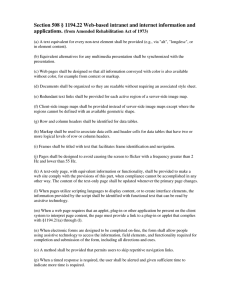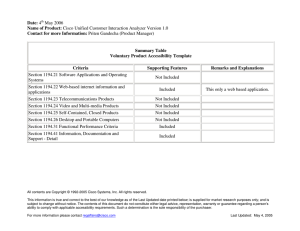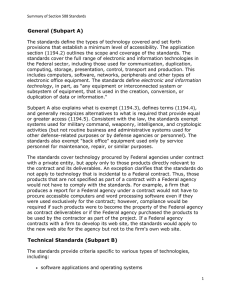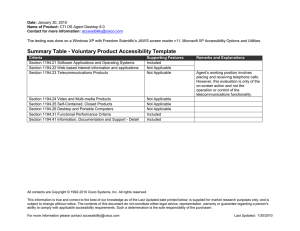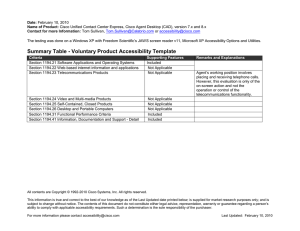Document 14183895
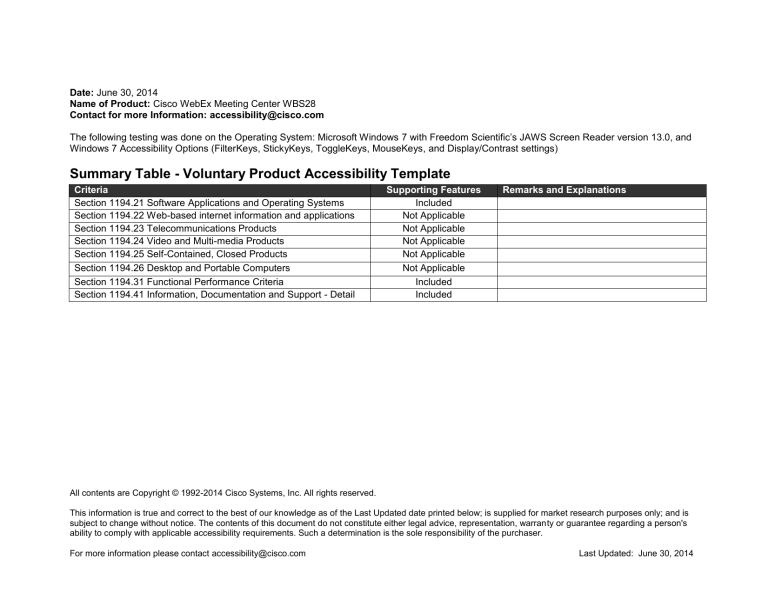
Date: June 30, 2014
Name of Product: Cisco WebEx Meeting Center WBS28
Contact for more Information: accessibility@cisco.com
The following testing was done on the Operating System: Microsoft Windows 7 with Freedom Scie ntific’s JAWS Screen Reader version 13.0, and
Windows 7 Accessibility Options (FilterKeys, StickyKeys, ToggleKeys, MouseKeys, and Display/Contrast settings)
Summary Table - Voluntary Product Accessibility Template
Criteria
Section 1194.21 Software Applications and Operating Systems
Section 1194.22 Web-based internet information and applications
Section 1194.23 Telecommunications Products
Section 1194.24 Video and Multi-media Products
Section 1194.25 Self-Contained, Closed Products
Section 1194.26 Desktop and Portable Computers
Section 1194.31 Functional Performance Criteria
Section 1194.41 Information, Documentation and Support - Detail
Supporting Features
Included
Not Applicable
Not Applicable
Not Applicable
Not Applicable
Not Applicable
Included
Included
Remarks and Explanations
Al l contents are Copyright © 1992-2014 Cisco Systems, Inc. All rights reserved.
This information is true and correct to the best of our knowledge as of the Last Updated date printed below; is supplied for market research purposes only; and is subject to change without notice. The contents of this document do not constitute either legal advice, representation, warranty or guarantee regarding a person's ability to comply with applicable accessibility requirements. Such a determination is the sole responsibility of the purchaser.
For more information please contact accessibility@cisco.com Last Updated: June 30, 2014
Section 1194.21: Software Applications and Operating Systems – Detail
508 Clause
1194.21(a)
Criteria Supporting
Features
Supports with
Exceptions
Remarks and Explanations
1194.21(b)
1194.21(c)
When software is designed to run on a system that has a keyboard, product functions shall be executable from a keyboard where the function itself or the result of performing a function can be discern textually.
Applications shall not disrupt or disable activated features of other products that are identified as accessibility features, where those features are developed and documented according to industry standards. Applications also shall not disrupt or disable activated features of any operating system that are identified as accessibility features where the application programming interface for those accessibility features has been documented by the manufacturer of the operating system and is available to the product developer.
A well-defined on-screen indication of the current focus shall be provided that moves among interactive interface elements as the input focus changes. The focus shall be programmatically exposed so that Assistive
Technology can track focus and focus changes.
Supports with
Exceptions
Supports with
Exceptions
Some key interface areas provide keyboard navigation, such as menus, quick start and meeting info tabs, preferences, participants list, chat panel, polling panel, and sharing controls.
However, some other elements and dialogues are not fully accessible using keyboard-only navigation.
For most functions, the product does not disrupt or disable the accessibility features built into the Windows operating system
(specifically FilterKeys, StickyKeys, ToggleKeys, and
MouseKeys). There is a small exception in the whiteboard screen using MouseKeys- a user can erase, draw arrows via the arrow tool, etc. but is unable to create lines using the pen tool and MouseKeys click and drag equivalent.
Visual indications exist for most elements receiving focus, but not all elements are able to receive focus and certain elements are not fully compatible with screen reader assistive technology.
Al l contents are Copyright © 1992-2014 Cisco Systems, Inc. All rights reserved.
This information is true and correct to the best of our knowledge as of the Last Updated date printed below; is supplied for market research purposes only; and is subject to change without notice. The contents of this document do not constitute either legal advice, representation, warranty or guarantee regarding a person's ability to comply with applicable accessibility requirements. Such a determination is the sole responsibility of the purchaser.
For more information please contact accessibility@cisco.com Last Updated: June 30, 2014
1194.21(d)
1194.21(e)
1194.21(f)
1194.21(g)
1194.21(h)
1194.21(i)
1194.21(j)
Sufficient information about a user interface element including the identity, operation and state of the element shall be available to Assistive Technology. When an image represents a program element, the information conveyed by the image must also be available in text.
When bitmap images are used to identify controls, status indicators, or other programmatic elements, the meaning assigned to those images shall be consistent throughout an application's performance.
Textual information shall be provided through operating system functions for displaying text. The minimum information that shall be made available is text content, text input caret location, and text attributes.
Applications shall not override user selected contrast and color selections and other individual display attributes.
When animation is displayed, the information shall be displayable in at least one non-animated presentation mode at the option of the user.
Color coding shall not be used as the only means of conveying information, indicating an action, prompting a response, or distinguishing a visual element.
When a product permits a user to adjust color and contrast settings, a variety of color selections capable of producing a range of contrast levels shall be provided.
Supports with
Exceptions
Supports with
Exceptions
Supports with
Exceptions
Does Not
Support
Supports with
Exceptions
Supports
Not Applicable
Some elements lack proper informative labels or are not fully compatible with screen reader technology.
Some elements are not fully compatible with screen reader assistive technology.
Some custom text displays are not fully accessible to screen reader assistive technology.
Product does not correctly inherit high contrast settings.
Animations are used to indicate ongoing audio input levels and do not have a non-animated or text equivalent.
Product does not provide users the option to adjust environment contrast settings. For areas such as whiteboard annotation a variety of colors are provided, as well as the option for a light or dark background.
Al l contents are Copyright © 1992-2014 Cisco Systems, Inc. All rights reserved.
This information is true and correct to the best of our knowledge as of the Last Updated date printed below; is supplied for market research purposes only; and is subject to change without notice. The contents of this document do not constitute either legal advice, representation, warranty or guarantee regarding a person's ability to comply with applicable accessibility requirements. Such a determination is the sole responsibility of the purchaser.
For more information please contact accessibility@cisco.com Last Updated: June 30, 2014
1194.21(k)
1194.21(l)
Software shall not use flashing or blinking text, objects, or other elements having a flash or blink frequency greater than 2 Hz and lower than 55 Hz.
When electronic forms are used, the form shall allow people using Assistive
Technology to access the information, field elements, and functionality required for completion and submission of the form, including all directions and cues.
Supports
Supports with
Exceptions
Product does not use flashing or blinking text, objects, or other elements having a flash or blink frequency greater than 2 Hz and lower than 55 Hz.
Some form items lack full keyboard navigation and screen reader compatibility.
Al l contents are Copyright © 1992-2014 Cisco Systems, Inc. All rights reserved.
This information is true and correct to the best of our knowledge as of the Last Updated date printed below; is supplied for market research purposes only; and is subject to change without notice. The contents of this document do not constitute either legal advice, representation, warranty or guarantee regarding a person's ability to comply with applicable accessibility requirements. Such a determination is the sole responsibility of the purchaser.
For more information please contact accessibility@cisco.com Last Updated: June 30, 2014
Section 1194.31: Functional Performance Criteria – Detail
Clause
1194.31(a)
1194.31(b)
Criteria
At least one mode of operation and information retrieval that does not require user vision shall be provided, or support for
Assistive Technology used by people who are blind or visually impaired shall be provided.
At least one mode of operation and information retrieval that does not require visual acuity greater than 20/70 shall be provided in audio and enlarged print output working together or independently, or support for Assistive Technology used by people who are visually impaired shall be provided.
Status
Supports with
Exceptions
Support with
Exceptions
1194.31(c) At least one mode of operation and information retrieval that does not require user hearing shall be provided, or support for Assistive Technology used by people who are deaf or hard of hearing shall be provided
Supports
Comments
See remarks/comments in
1194.21(a)(c)(d)(e)(f)(l)
See remarks/comments in
1194.21(c)(d)(e)(g)(h)(j)(k)
1194.31(d)
1194.31(e)
1194.31(f)
Where audio information is important for the use of a product, at least one mode of operation and information retrieval shall be provided in an enhanced auditory fashion, or support for assistive hearing devices shall be provided.
At least one mode of operation and information retrieval that does not require user speech shall be provided, or support for Assistive Technology used by people with disabilities shall be provided.
At least one mode of operation and information retrieval that does not require fine motor control or simultaneous actions and that is operable with limited reach and strength shall be provided.
Not Applicable
Supports
Supports with
Exceptions
Multiple features support, including chat functionalities and available closed captioning. If desired an ASL interpreter can also attend the meeting and share video of real-time ASL translation.
Relies on a user’s associated computer and/or phone devices. Supports if deployed with Cisco 7900 series IP phone- see phone VPAT for details.
See remarks/comments in
1194.21(a)(b)(c)(l)
Al l contents are Copyright © 1992-2014 Cisco Systems, Inc. All rights reserved.
This information is true and correct to the best of our knowledge as of the Last Updated date printed below; is supplied for market research purposes only; and is subject to change without notice. The contents of this document do not constitute either legal advice, representation, warranty or guarantee regarding a person's ability to comply with applicable accessibility requirements. Such a determination is the sole responsibility of the purchaser.
For more information please contact accessibility@cisco.com Last Updated: June 30, 2014
1194.41: Information, Documentation and Support
508 Clause
1194.41(a)
1194.41(b)
1194.41(c)
Criteria Supporting
Features
Supports Product support documentation provided to end-users shall be made available in alternate formats upon request, at no additional charge
End-users shall have access to a description of the accessibility and compatibility features of products in alternate formats or alternate methods upon request, at no additional charge.
Support services for products shall accommodate the communication needs of end-users with disabilities.
Supports
Supports
Remarks and Explanations
Accessible documentation is available through Cisco TAC upon request.
Accessible documentation is available through Cisco TAC upon request.
Cisco conforms through equal facilitation.
Customers may reach Cisco Technical
Assistance Center (TAC) via Phone,
Email or Web Form. All cases open through email or web are opened as
Priority 3 cases. All Priority 1 or
Priority 2 case can only be opened via the telephone. TTY users must call the
Text Relay Service (TRS) by dialing 711 and have the TRS agent contact Cisco
TAC via voice.
Al l contents are Copyright © 1992-2014 Cisco Systems, Inc. All rights reserved.
This information is true and correct to the best of our knowledge as of the Last Updated date printed below; is supplied for market research purposes only; and is subject to change without notice. The contents of this document do not constitute either legal advice, representation, warranty or guarantee regarding a person's ability to comply with applicable accessibility requirements. Such a determination is the sole responsibility of the purchaser.
For more information please contact accessibility@cisco.com Last Updated: June 30, 2014
